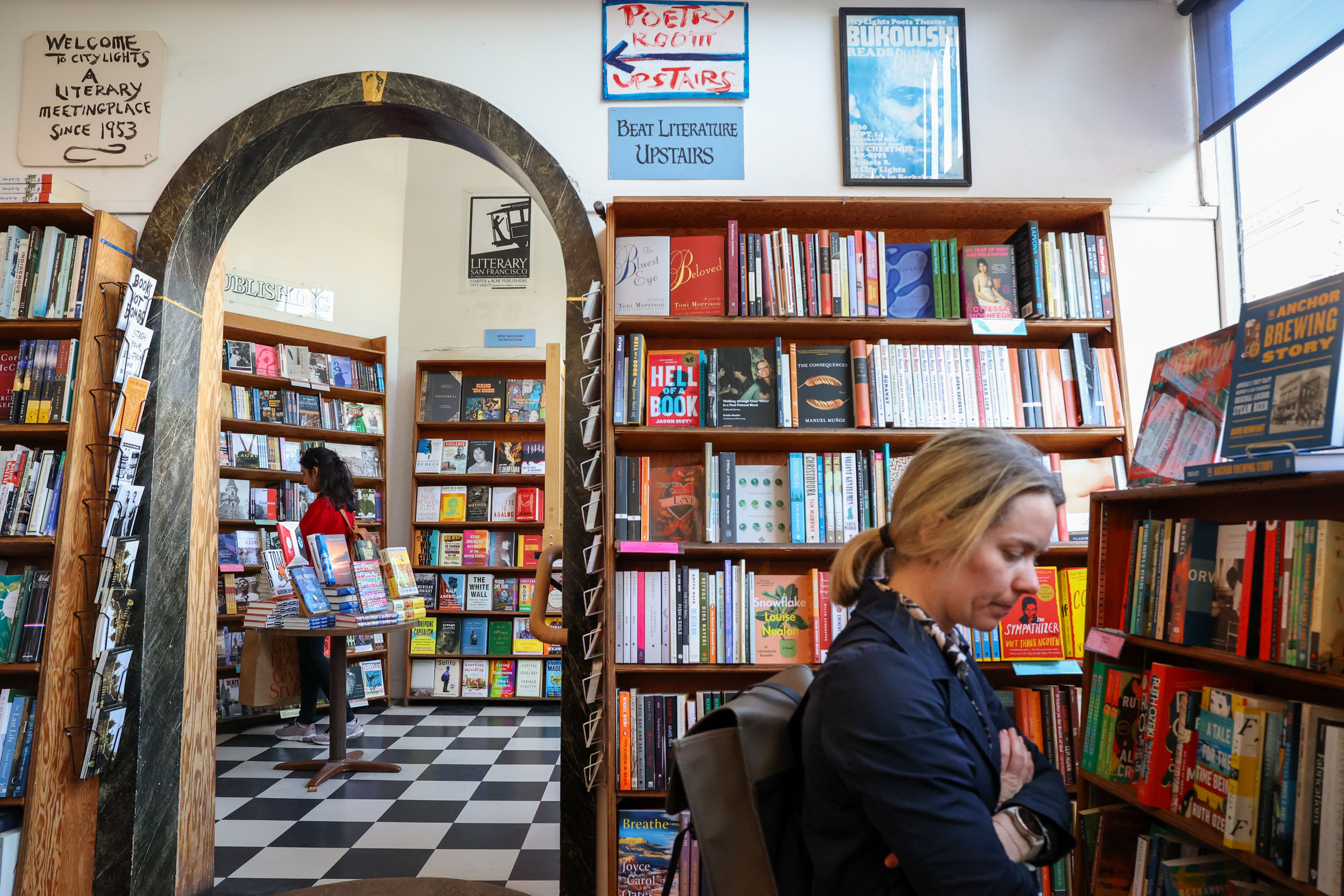On a windswept day in 1950, a Navy veteran and literary scholar named Lawrence Ferlinghetti stepped off the ferry at the Embarcadero after journeying across the country by rail. Having just spent time in France, San Francisco’s jagged outline of white buildings and hilltops captured his imagination right away, conjuring comparisons to Mediterranean ports half a world away.
“I thought perhaps it was Atlantis risen, from the sea,” he wrote in 1998.
Ferlinghetti moved to San Francisco hoping to become a successful painter and ended up opening a bookstore—City Lights on Columbus Avenue in North Beach in 1953.
Seventy years later, City Lights has outlived countless other bookstores, libraries and Ferlinghetti himself, who passed away in 2021 at the age of 101. Still brimming with anti-authoritarian literature, histories and poetry, when set against San Francisco’s tech-driven transmutations, City Lights is largely preserved in amber.
Back in 1998, amid the dot-com era, Ferlinghetti was acutely aware and concerned about the tenuous place of a poetry-driven bookstore in San Francisco.
The city of San Francisco had just named Ferlinghetti as its first poet laureate, and shortly after he wrote an essay that would serve as the “Inaugural Address” to his 2001 book San Francisco Poems. He prophesied the possible demise of the city as an artistic enclave, quoting a 1998 San Francisco Bay Guardian article that described it as “a city undergoing a radical transformation—from a diverse metropolis that welcomed immigrants and refugees around the world to a homogenous, wealthy enclave.”
Then and now, North Beach is often dismissed as a tourist trap—a knock-off Little Italy—and at that point in time, Ferlinghetti feared that this negative reputation would subsume his beloved artist colony.
“This past weekend North Beach looked like a theme-park, literally overrun by tourists, and kitsch was king,” he wrote. “What happened to it? What makes for a free poetic life? What destroys the poetry of a city?”
Fortunately, Ferlinghetti had at least one answer to his own question, creating a nonprofit foundation for City Lights to help ensure his bookstore and publishing house’s survival. He also urged poets to make the news.
“What I had in mind […] was for poets to stop mumbling in their beards to a private audience and say something important to the world,” he wrote.
Ferlinghetti’s “Populist Manifesto” has new resonance in 2023, an era in which San Francisco finds itself at a precarious crossroads of technocracy and poverty. City Lights is 70 this year, but we probably have the most to learn from its first decade in North Beach.
Originally, Ferlinghetti conceived of the idea for City Lights with a San Francisco State College sociology professor named Peter Dean Martin. They hoped to publish and sell books by authors with anti-authoritarian ideas, the first volume of which was a 4×6 pocket poetry book of works by Ferlinghetti. Next, he commissioned other writers and poets to contribute to the pocket poet series.
City Lights found its strongest creative output within the Beat Generation, a boys’ club of nonconformist writers with a proclivity for jazz and spoken word and an all-out rejection of the academic elite—authors like Allen Ginsberg, Jack Kerouac, William S. Burroughs and Gary Snyder.
The fourth book that City Lights ever published was a peyote-addled revelation about the ruin of a generation by conservative political and cultural forces—Howl by Ginsberg. Initially, the authorities did not consider verses like “The asshole is holy!” to be particularly revelatory, promptly arresting Ferlinghetti on obscenity charges. The case ultimately set a crucial precedent for First Amendment rights. Because the poem contains literary value, the court ruled that Howl is, by definition, not obscene.
Howl was in good radical company on City Lights’ shelves. Co-owner Peter Dean Martin was the son of Italian labor organizer Carlo Tresca, who was assassinated on the streets of New York City in the early 1940s—rumor has it, by the mafia. As such, City Lights’ political literature leaned anarchist from the beginning, distributing two Italian language anarchist newspapers until they both went out of print in the 1960s.
Always a poet who split his time as a painter, publisher and community organizer, Ferlinghetti remained a prolific author throughout his life, publishing a poetry collection called A Coney Island of the Mind in 1958 that sold over a million copies.
Ferlinghetti’s legacy is immortalized within the walls of the bookstore and beyond. It extends to the alleyway beside City Lights, which he led a fight to rehabilitate and rename in honor of Jack Kerouac, a friend of Ferlinghetti’s who frequented the bookstore. Ferlinghetti lent Kerouac his cabin in Big Sur, where he wrote the book of the same name over 10 days in 1961. Ferlinghetti’s influence can still be felt next door at Vesuvio Cafe—a historic beatnik watering hole—and across the city.
City Lights’ Marketing and Communications Associate Natalie Longwell told The Standard that the bookstore has a series of events planned for the 70th anniversary in the spring and fall of 2023 that have yet to be announced.
Ultimately much more than a bookstore, City Lights feels at once like a relic of a bygone era and timeless, a place with a sense of belonging that’s reflected in the verses contained along its shelves. The first poem that Ferlinghetti ever wrote about San Francisco, “Away above a Harborful,” describes a quiet North Beach rooftop set above the clamor of the city, a moment caught between transience and permanence. He describes a woman hanging her sheets out to dry between clothespins:
she tosses back her head
in voiceless laughter
and in choiceless gesture then
shakes out gold hair
while in the reachless seascape spaces
between the blown white shrouds
stand out the bright steamers
to kingdom come
